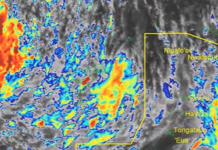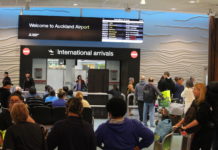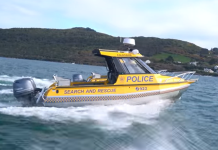By Craig Kapitan, the NZ Herald
A former high school prefect and deputy head boy turned corrupt baggage handler has lost his bid for a discharge without conviction for participating in an organised crime syndicate that smuggled hundreds of kilograms of methamphetamine into New Zealand by exploiting a loophole in Auckland Airport’s security.
Māngere Bridge resident Kimela Kolo Piukana, 24, was initially alleged to be part of a group of airport workers who, on several occasions in 2021, were tasked with secretly removing illicit drug shipments stowed aboard Malaysian Airlines flights from Kuala Lumpur and Air New Zealand flights from Los Angeles.
“The drugs were subsequently driven off airport grounds and on-supplied to other members of the syndicate,” court documents state.
As part of his guilty plea in June, the Crown conceded he was no longer alleged to have physically removed the drugs from the aircraft. He instead was sentenced for acting as an intermediary between key members of the syndicate, passing along messages via texts.
That concession reduced his culpability, defence lawyer Ben Mugisho said late last month as he asked Justice Michele Wilkinson-Smith for a discharge without conviction. He noted his client had never been in trouble before his arrest in November 2021 after a lengthy undercover police and Customs investigation dubbed Operation Selena.
Piukana had been a university student before dropping out in 2017 to look after his ailing father, Mugisho said, explaining that after his client’s father died Piukana came under the bad influence of a man who was more intricately involved in the meth import conspiracy. That other man, who has also pleaded guilty, has interim name suppression as he awaits sentencing.
Piukana pleaded guilty in June to participating in an organised criminal group, which carries a sentence of up to 10 years’ imprisonment.
The admission of guilt came a week and a half before he was set to go to trial in the High Court at Auckland among multiple co-defendants, including alleged kingpin Nigel Iuvale. Seven others followed suit with their own guilty pleas one week after Piukana, leaving only Iuvale and baggage handler Tungane Manuel to go to trial. Jurors found both men guilty last month.
Piukana is the first of the group to have been sentenced.
Police alleged at the time of their arrests that the group had either successfully smuggled or tried to smuggle roughly 500kg of methamphetamine. While the cost of methamphetamine can fluctuate, that amount has been described by police in prior drug import cases as having a value of between $50 million and $90m in New Zealand – considered one of the most profitable meth markets in the world.
“This type of offending is highly concerning not only because of the harm drugs are doing to the community, but the ability to place unchecked items into aircraft … threatens the integrity and security of air travel,” Detective Inspector Paul Newman said at the time of the arrests, estimating an influx of 500kg of the drug on to the underground market would have caused “around $550m in community harm … particularly in vulnerable communities”.
Piukana’s lawyer said his client has ambitions of someday becoming a personal trainer, but a conviction on his record may serve as a barrier. Crown prosecutor Ruby van Boheemen argued against a discharge without conviction, pointing to the seriousness of the charge.
“If those in charge of the syndicate didn’t have members at every level, that syndicate wouldn’t be able to function,” she said, adding the consequences of a conviction wouldn’t be “out of all proportion” to the seriousness of the crime – the standard by which discharge without conviction requests are considered.
Justice Wilkinson-Smith described the offending of Piukana and his co-defendants as “a level of corruption unusual to New Zealand” and as “damaging to New Zealand’s reputation”.
The judge rejected the suggestion Piukana had been ignorant to what was going on when he passed along the messages.
“You must have had a very good idea of what was occurring,” she said, adding that even if he didn’t know the exact amount of methamphetamine being imported he would have been aware it was a commercial quantity. “You knew what was happening and you helped. You gave real assistance.
“You were at best wilfully blind.”
But the judge also noted his young age at the time of offending and his prospect for rehabilitation, allowing for a 25% discount from the starting point of two years and three months suggested by the Crown. An additional 15% reduction was applied for his guilty plea, as well as two months for the time he was under strict bail conditions awaiting trial.
She settled on a sentence of seven months’ home detention.
The judge said the co-defendant who pulled Piukana into the scheme “should be ashamed”.
“You are, however, an adult,” she said. “You were capable of being better than this, and you are capable of being better than this in the future.”
Craig Kapitan is an Auckland-based journalist covering courts and justice. He joined the Herald in 2021 and has reported on courts since 2002 in three newsrooms in the US and New Zealand.







